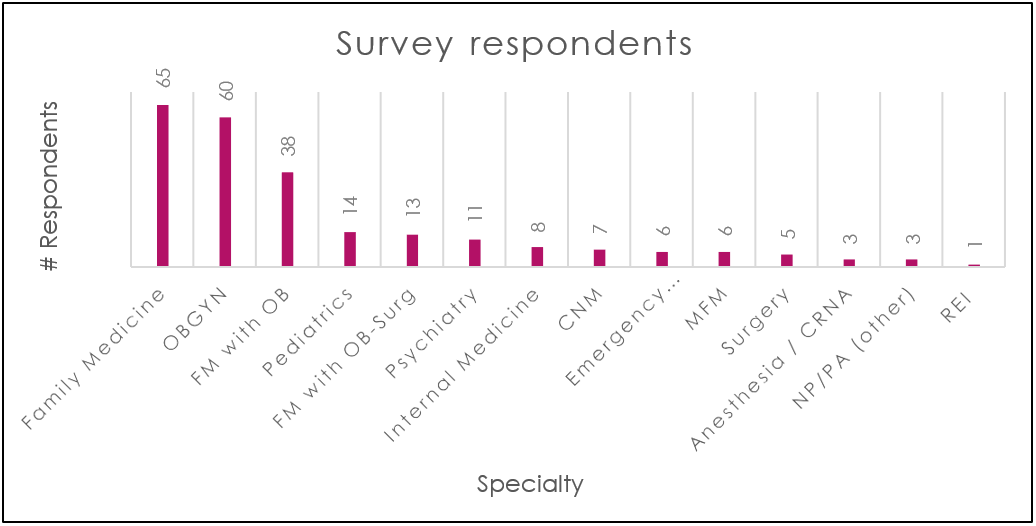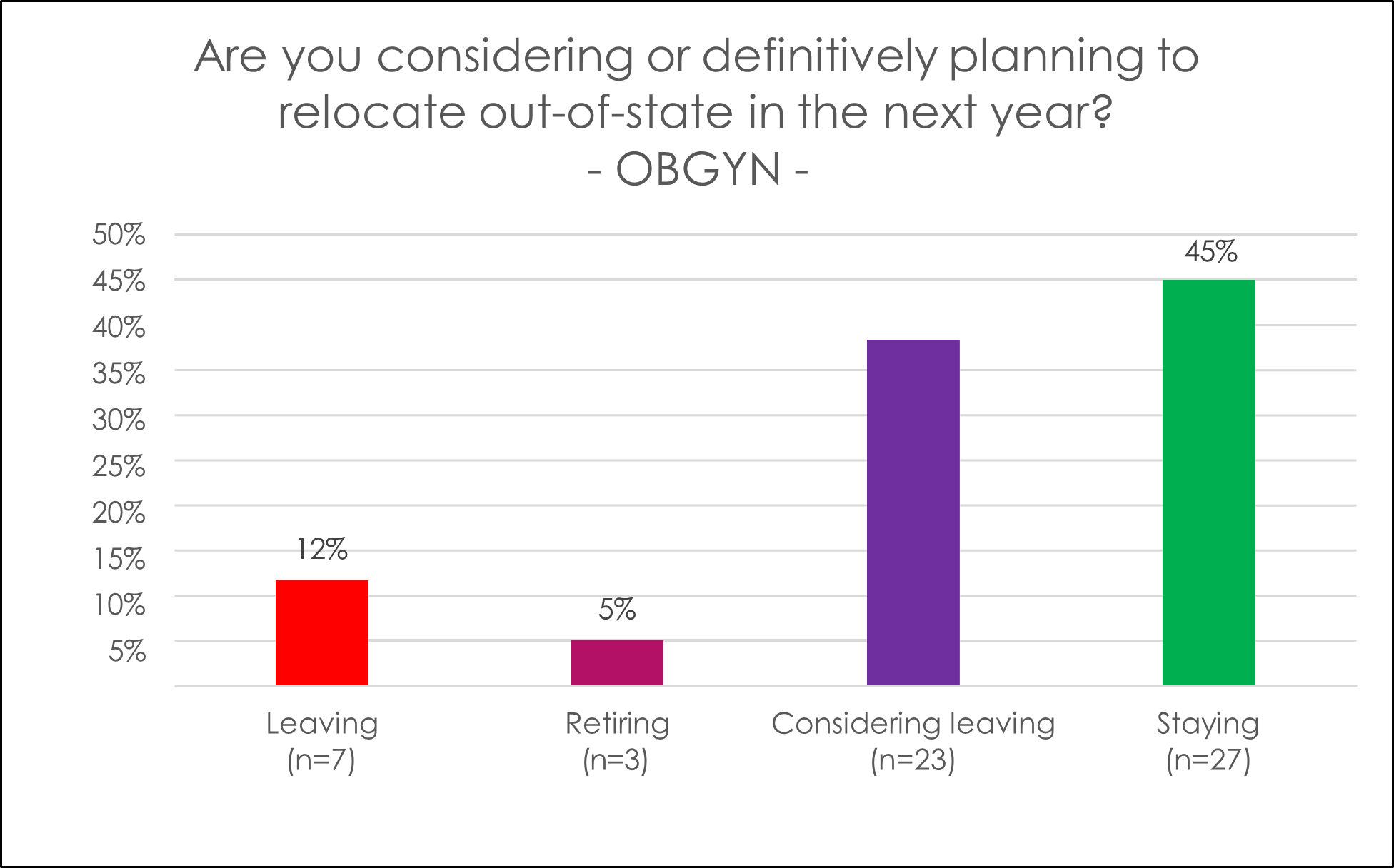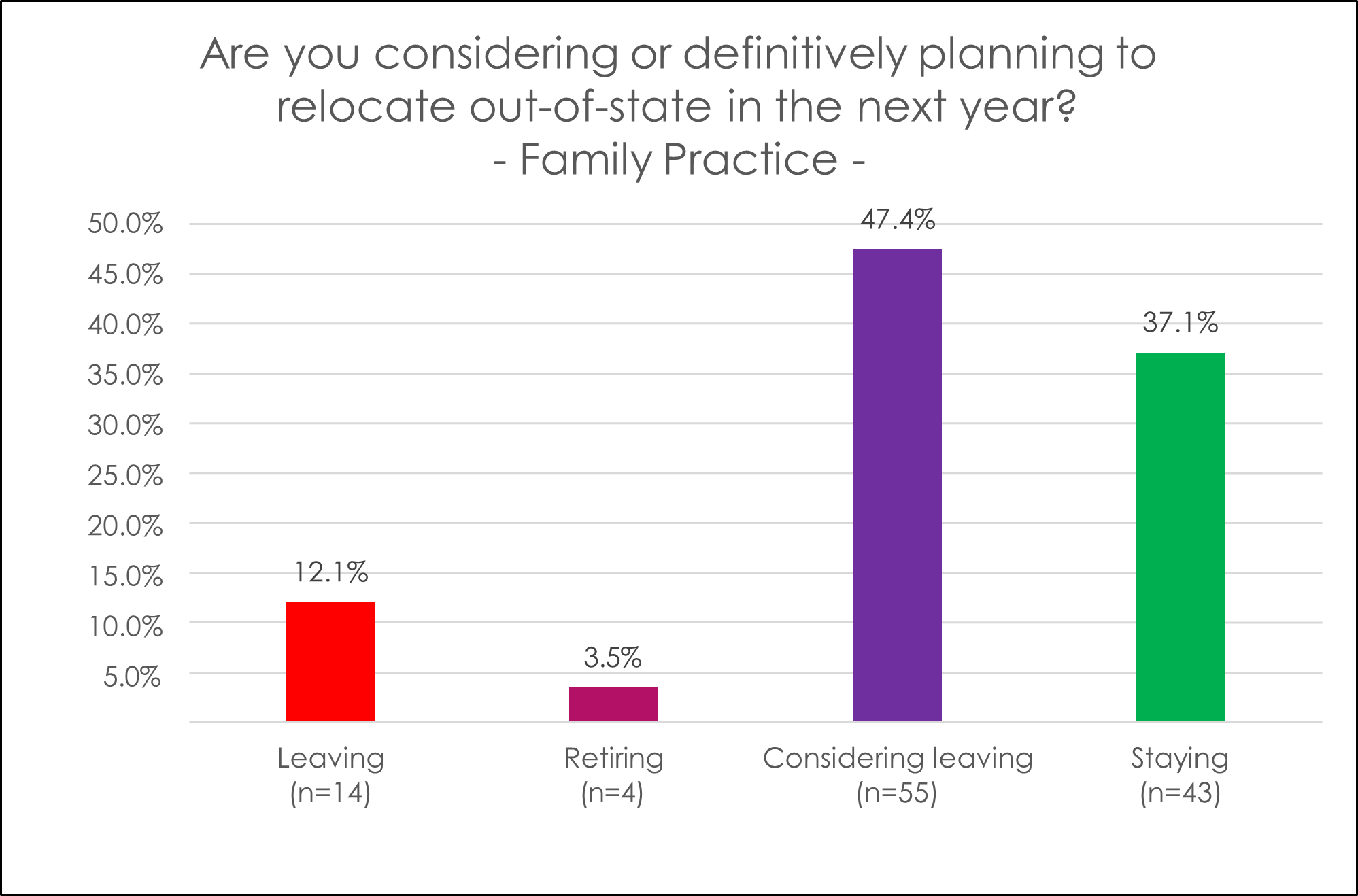Idaho Physician Retention Survey – May 2023Data supplied by the Idaho Coalition for Safe Reproductive Health Care
Fear of imprisonment among healthcare providers in response to this legislation was strong. Providers were left to grapple with the moral injury of being unable to preserve the “health” (including mental health) of their patients, as current law only allowed providers to “prevent death”. Not surprisingly this led to significant concerns regarding recruitment and retention of health care providers, particularly for providers of women’s health care. To assess the potential impact of these new laws, the Idaho Coalition for Safe Reproductive Health Care (ICSRHC) conducted an initial grassroots survey of healthcare providers during the first half of the 2023 legislative session. Respondents included Family Practitioners, OBGYNs, Maternal-Fetal-Medicine Specialists (MFMs), Certified Nurse Midwives, Emergency Physicians, Surgeons, Pediatricians, Internists, and others. The initial survey found that 64% of all respondents were considering relocating out of state in the next year. Of the 45 OBGYNs who responded to the survey, 51% stated they were considering leaving Idaho, along with 66% of the MFMs. The survey also queried providers about the likelihood that they would stay in Idaho if the legislature modified the existing abortion laws to allow exceptions to preserve the health of the patient (not just “prevent death”). Of those OBGYNs who were considering leaving Idaho, 96% stated they would “consider staying” or would “very likely stay” if such an amendment to the law were passed. Little modification was made to IC 18-622 in 2023. The law was amended only to replace the affirmative defense with exceptions, and to provide clarification for law enforcement officials regarding the provision of a redacted report following a patient’s report of rape/incest within 72 hours (to facilitate the timely delivery of this document being provided to a physician for the patient to be eligible for a legal abortion). With 96% of OBGYNs reporting they would stay in Idaho if health exceptions were added, the ICSRHC conducted a follow-up survey of physicians following the conclusion of the 2023 legislative session. Herein we present the survey findings: This follow-up study surveyed 240 physicians and advanced practice providers, across an array of specialties. The largest number of respondent groups were Family Practitioners (n=116, 48%) and OBGYNs (n=60, 25%). Of the Family Practitioners 51 (or 44%) reported having obstetrical care as a part of their practice.
Figure 1. 2023 Survey Respondents by Provider Specialty
For the entire survey group, including all provider specialties, the percentage of providers considering or “definitely leaving” Idaho was similar to the initial survey (57% vs 66% in the initial survey), with 44% reporting they were “considering leaving” and 13% “definitely leaving” following the 2023 legislative session. For the specialty of OBGYN (60 respondents), 50% reported they were “definitely leaving” or still “considering leaving”, with another 5% reporting a plan for retirement in the next year.
Figure 2. 2023 OBGYN Specialty ResponsesOf the 30 OBGYN respondents who reported planning to leave or who are still considering leaving, the majority (63%) responded that their decision would likely have been changed (to stay in Idaho) had the Idaho Legislature modified the abortion bans to allow for maternal health exceptions. Another 20% reported they are still hopeful that the legislature will make changes soon to allow for maternal health exceptions. Among these same OBGYN respondents, 55% reported they would also be more likely to consider staying in Idaho if the legislature had amended the laws to allow for abortion in the case of severe life-limiting fetal anomalies. Among Family Practitioners (116 respondents) more than half of respondents indicated they are “definitely leaving” (12%) or “considering leaving” (47%) their Idaho practice this year. A small percentage reported a plan to retire in the next year (3.5%), with 50% of those retiring citing the restrictions on reproductive health care as a contributing factor in their decision to retire this year.
Figure 3. Family Medicine Specialty Responses Of the 68 Family Practitioner respondents who reported a plan to leave or who are still considering leaving, 100% indicated that the abortion laws were contributing to their decision. Only 42% indicated that they would have stayed (30%) or have been more likely to consider staying (12%) had the Idaho legislators modified the abortion laws to allow for health exceptions in the 2023 session. In comparison to the OBGYN respondents, the Family Practice providers were more likely to be holding out hope for legislative changes in the near future (51% vs 23%) with regard to health exceptions. The Family Practitioner respondents were similar to the OBGYNs with regard to exceptions for fetal anomalies, with 47% reporting they would be more likely to stay in Idaho if the legislature had amended the laws to allow for abortion in the case of severe life-limiting fetal anomalies. Other specialty groups with 10 or more respondents included Psychiatry (11 respondents), and Pediatrics (14 respondents). Ten of the 11 psychiatry respondents indicated they were either leaving (n=1) or considering leaving (n=9) Idaho, with 8 citing the abortion restrictions as a primary contributor to their future plans. Two pediatricians already have plans to leave the state, while another 10 (71%) are considering leaving, with 100% citing abortion restrictions as a contributing factor to their career plans. In total 30 providers responded that they have definite plans to leave Idaho this year and an additional 7 providers are planning retirement. Twenty-seven of the providers planning to leave come from the specialty groups most directly impacted by the abortion restrictions, including OBGYNs, MFMs, Pediatricians, Family Physicians, and Psychiatrists. Of those leaving, 25 also cited restrictions on gender-affirming care as a contributing factor in their decision to seek employment out-of-state. Summary: Survey data support the conclusion that healthcare providers plan to leave Idaho as a direct result of the restrictions placed on access to safe reproductive health care in Idaho. Maternal-fetal medicine has experienced the most significant impact since the summer of 2022. At the start of 2022 Idaho had 9 in-state MFM physicians (with 7 being full-time). As of today, 3 providers have already left, 2 have submitted resignations, 1 is retiring and 1 part-time provider plans to cut back their Idaho practice further, leaving only 4 physicians to care for the most complex obstetric patients in the state. Greater reliance on out-of-state MFM providers in Salt Lake City, Spokane, and Portland will likely be the reality by the end of 2023. Patients, most of whom have highly desired pregnancies, will be the ones who suffer due to long wait- times and long travel distances to obtain the specialty services they need to have the healthiest pregnancy outcome possible. The responses from Idaho psychiatrists should also raise significant alarms for state leaders. Idaho has ranked at the very bottom of mental health providers per capita year-over-year in the U.S., with 50% fewer per capita than Montana. Idaho consistently ranks near the top for suicide rates in the country. Losing even just a small fraction of the psychiatrists in Idaho could result in devastating consequences for the citizens of Idaho who are already struggling to access this healthcare specialty. In a state as rural as Idaho, family practitioners are the foundation upon which our patients depend to access health and life-preserving care. Fourteen family practitioners already plan to leave Idaho, with 12 of these 14 practicing in our state's rural regions outside of the Treasure Valley. Whereas rural healthcare providers commonly deliver far more than just obstetric care, the loss of one family physician in a rural community can have a devastating effect on pediatric care, geriatric care, and the entire range of preventative and urgent care services needed to sustain a healthy community. Legislative interference in the patient-provider relationship is impacting provider retention in Idaho. The trickle-down effects of losing healthcare providers are vast, but often difficult to quantify, especially in the short term. However, epidemiologic surveillance has demonstrated consistently that across the spectrum of healthcare delivery, health outcomes are worse, in regions affected by low numbers of providers. Our survey results indicate that if Legislators don’t act soon to modify the abortion laws, the delivery of care across Idaho may be damaged to a point beyond repair for years to come. |





